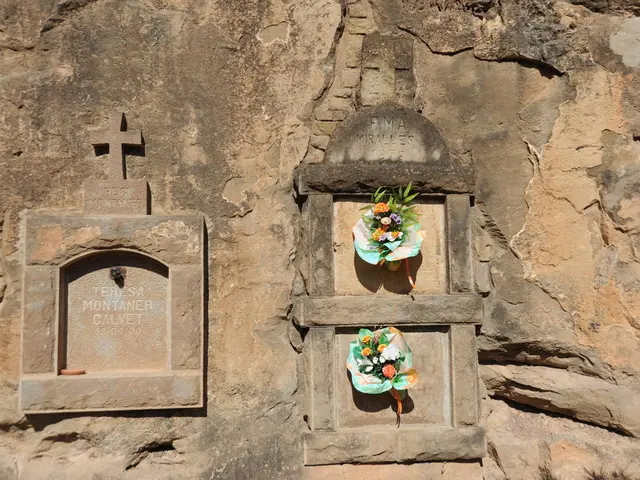Episcopal Church official deems prioritizing Afrikaners over other refugees an inexplicable act
Title: The Episcopal Church's Moral Stand Against White Afrikaner Resettlement
Updated: May 14, 2025, 1:17 PM CDT
The Episcopal Church has cut ties with the U.S. government's refugee resettlement program after refusing to aid the Trump administration in resettling white Afrikaners from South Africa. In a heartfelt message to its members, the church emphasized its unwavering commitment to racial justice as the driving force behind its decision.
In an exclusive interview with NPR's Michel Martin, Presiding Bishop Sean Rowe shed light on the factors that led to this decisive move. Rowe, the church's youngest presiding bishop ever, expressed that the administration's request to assist in resettling white Afrikaners was a moral line the church simply couldn't cross.
The administration's claim that white South African farmers, known as Afrikaners, are facing genocide and land seizures has been repeatedly stated by President Trump, yet lacks substantiated evidence. This year, the administration classified white Afrikaners as refugees[Y1]. During a White House press briefing, Trump asserted, "It's a genocide that's taking place that you people don't want to write about, but it's a terrible thing that's happening. And farmers are being killed. They happen to be white, but whether they're white or Black makes no difference to me, but white farmers are being brutally killed, and their land is being confiscated in South Africa."
NPR recently reported that South Africa's land reform law allows for land expropriation, but no land has been seized from white farmers[Y2]. White South Africans make up only 7% of the country's population and yet control approximately 70% of commercial farmland.
During the interview, Bishop Rowe depicted the church's motivation behind discontinuing its relationship with the current administration. "We don't feel like we can be ourselves in the Episcopal Church and take the step of resettling white Afrikaners from South Africa. Our church has a deep-rooted commitment to racial justice and reconciliation," Rowe stated.
Pointing to the historical ties between the Episcopal Church and the Anglican Church in South Africa, Rowe continued, "We have strong ties to that country and the fight against racism and apartheid. The idea that we would be somehow resettling Afrikaners at this point over other refugees, who have been vetted and waiting in camps for months or even years, is unfathomable to us."
Martin probed Rowe's thoughts on the president's assertion that white Afrikaners are facing racist harassment and genocide. Rowe emphasized, "I don't think the data supports that claim. And classifying it as genocide is certainly a step too far."
Martin went on to ask why President Trump appears to show more sympathy towards Afrikaners compared to people from other parts of the world. Rowe admitted, "I don't understand why this is the case, except that it seems that people who are white are somehow more valuable than those who are people of color."
The halt of nearly all refugee entry into the United States by Trump shortly after taking office has caused a significant impact on refugee resettlement across the board[Y3]. In response to this pause, the church—in addition to ending its partnership with the U.S. government—will be redirecting its efforts towards working closely with immigrants and refugees on the ground.
"Since 1980, we've settled over 100,000 refugees, and now, no refugees are being allowed in," Rowe lamented. "Now, all of a sudden, Afrikaners have been fast-tracked over people who have assisted the government, over people who are being persecuted for their religion and political stance, people waiting to be reunified with their families. It just doesn't make any sense."
In conclusion, the Episcopal Church's termination of its partnership with the federal government will be formalized by the end of the current fiscal year. The church will maintain its dedication to advocating for the most vulnerable and continuing its work to care for the poor and marginalized.
Footnotes:
[1] Department of State. (2025). Remarks by Deputy Secretary of State Landau on South African Refugees. Retrieved from https://www.state.gov/remarks-by-deputy-secretary-of-state-landau-on-south-african-refugees/
[2] The Episcopal Church. (2025). Episcopal Church Ends Refugee Resettlement Partnership with US Government. Retrieved from https://www.episcopalchurch.org/news/episcopal-church-ends-refugee-resettlement-partnership-with-us-government
[3] Church World Service. (2025). Church World Service to Continue Refugee Resettlement despite Administration's Efforts to Limit Program. Retrieved from https://www.cwsglobal.org/programs/refugees-migrants/refugee-resettlement/church-world-service-continues-refugee-resettlement
[4] World Relief. (2025). World Relief Statement on Episcopal Church's Announcement to End Refugee Resettlement Program Partnership with the U.S. Government. Retrieved from https://www.worldrelief.org/press-releases/world-relief-statement-on-episcopal-church%E2%80%99s-announcement-to-end-refugee-resettlement-program-partnership-with-the-u-s-government
[5] NPR. (2025). Trump Classifies White South Africans As Refugees, Sparking Controversy. Retrieved from https://www.npr.org/2025/02/03/1076353860/trump-classifies-white-south-africans-as-refugees-sparking-controversy
[6] NPR. (2025). White South Africans Aren't Being Targeted. Here's What's Actually Happening. Retrieved from https://www.npr.org/2022/06/11/1100715971/white-south-africas-arent-being-targeted-whats-actually-happening
- The governement's classification of white Afrikaners as refugees in South Africa, a move criticized by the Episcopal Church, has sparked controversy in both the politics and general news sectors.
- In the midst of war-and-conflicts discussions, the Episcopal Church's decision to cut ties with the U.S. government's refugee resettlement program due to the controversial resettlement of white Afrikaners has become a significant community issue.
- The Episcopal Church's stance against the resettlement of white Afrikaners from South Africa signifies a stand against government policy-and-legislation that some view as racially biased.
- As crime-and-justice debates continue globally, the Episcopal Church's moral stand against the resettlement of white Afrikaners from South Africa has underscored the importance of justice and equity in the migration discourse.







